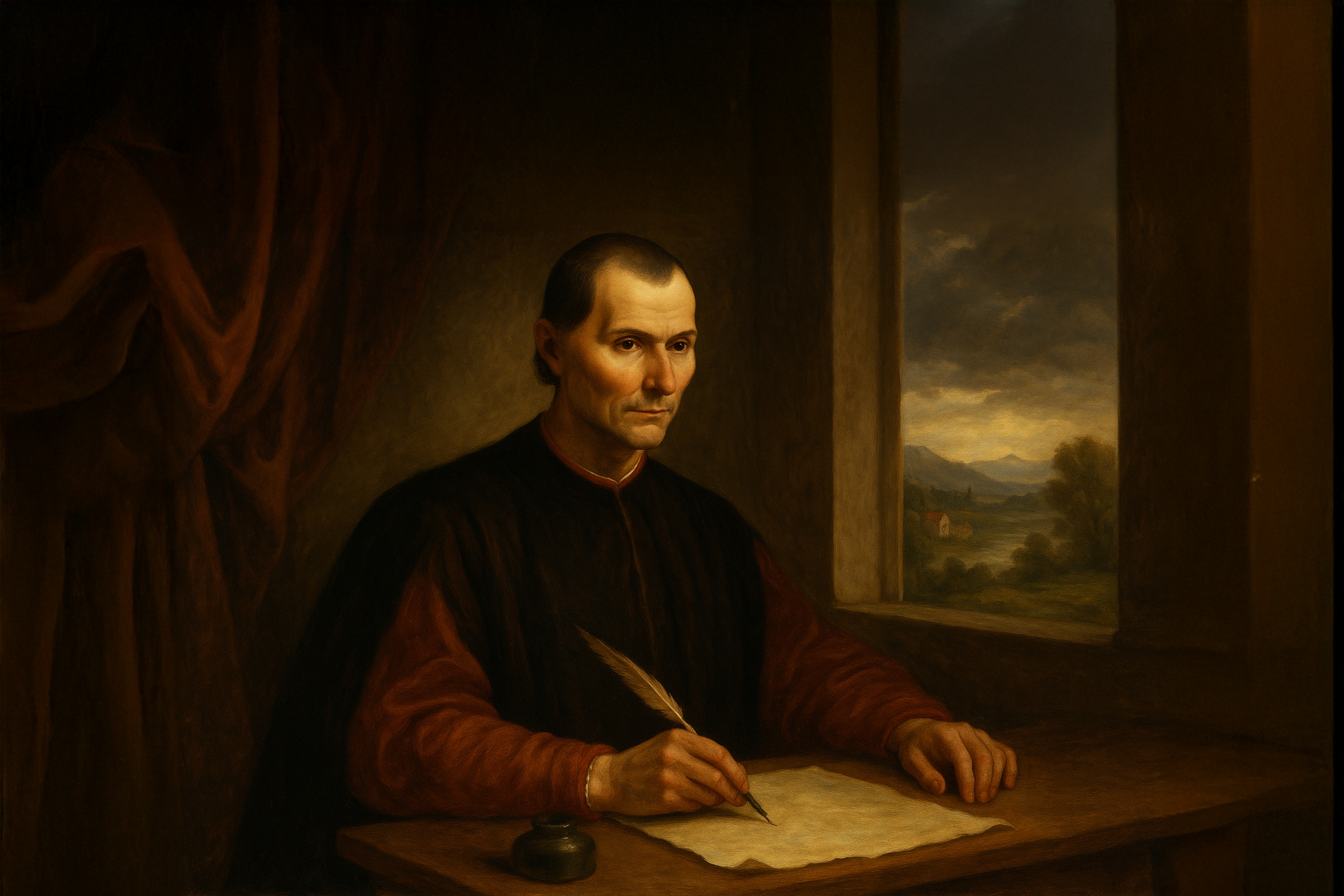Now Reading: Philosopher Deep Dive: Niccolò Machiavelli
-
01
Philosopher Deep Dive: Niccolò Machiavelli

Have you ever heard somebody call something Machiavellian and then thought to yourself, That sounds fancy — I should look that up later, only to then forget to ever look it up? Well, then this one’s for you. So next time someone says that, you can reply with a fitting “Ah, you mean like when virtù trumps fortuna?” and watch their face glitch while you sip your coffee like someone who actually reads the books they quote.
Today we take a deep dive into the Italian philosopher Niccolò Machiavelli. Who was he? What ideas did he have? And what can we learn from those ideas?
From Politician to Philosopher
Niccolò Machiavelli was an Italian political thinker, diplomat, and writer born in Florence in 1469. Living during the politically unstable period of the Italian Renaissance, he witnessed firsthand the constant power struggles between city-states, the influence of the Church, and the shifting alliances across Europe. In 1498, at the age of 29, he became a senior official in the Florentine Republic, where he handled foreign affairs and military matters (as a 29-year-old myself, this makes me doubt my life choices). His diplomatic missions — including dealings with the powerful Borgia family and various European monarchs — gave him deep insight into the brutal realities of power and politics.
His career came to a sudden halt in 1512 when the Medici family returned to power in Florence, overthrowing the republic. Machiavelli was dismissed, arrested, and even tortured under suspicion of conspiracy — as seems to be a rite of passage for a lot of philosophers. Though he was released, he was never able to return to public office. Instead, he retreated to his countryside estate, where he began writing. It was during this period of exile that he produced his most famous work, The Prince — a political treatise that offered a starkly realistic view of leadership, advocating for pragmatism, adaptability, and even deception when necessary. While some saw the book as a manual for tyranny, others recognized it as an honest reflection of political life.
Machiavelli continued to write until his death in 1527, producing other important works such as Discourses on Livy, which explored republican forms of government, and The Art of War, where he emphasized the importance of citizen militias over mercenaries. Though largely ignored or condemned during his lifetime, Machiavelli’s reputation grew in the centuries that followed. Today, he is seen as one of the founders of modern political science, admired for his clear-eyed analysis of power, leadership, and human behavior. As mentioned, his name lives on in the term “Machiavellian” — often misunderstood as simply cunning or ruthless, but more deeply tied to his belief in confronting political reality without illusion.
Act and Regret
Forget everything you associate with the word “virtue.” For Machiavelli, virtù has nothing to do with being nice, moral, or even good. It’s about ability. Guts. Skill. The sharp mix of courage, intelligence, timing, and force of will that lets a person shape their own fate — even in a messy, chaotic world.
A person with virtù doesn’t just react to what life throws at them. They scan the terrain, read the signs, and take action — even if it’s messy, uncomfortable, or doesn’t follow the “rules.” Machiavelli’s point is simple: being effective matters more than being liked. In fact, trying too hard to be good in a broken system can make you powerless. He’s not cheering on cruelty for cruelty’s sake — he’s saying that, sometimes, mercy is what gets you killed. And that leadership, whether of a country or your own life, requires a willingness to act when others hesitate.
But here’s the part I really take to heart: virtù is also about adaptability. The world shifts. Plans fail. People surprise you. If you stick rigidly to one way of doing things — even if it worked before — you’ll break. Machiavelli admired people who reinvented themselves when they had to. Not because it’s easy, but because it’s the only way to stay in the game.
So how do we apply this? It’s easy to wait for the “perfect” time to quit a job, confront someone, move cities, or pursue a goal. But waiting for the perfect moment is just fear wearing a nice outfit. Virtù is about taking responsibility for your path — knowing that the road might be bumpy, that you’ll mess up along the way, and doing it anyway. It’s not about being ruthless. It’s about being decisive. Initiative beats hesitation. And even if you don’t control the world, you do control how boldly you move through it.
Fortuna
Where virtù is everything you can control, fortuna is everything you can’t. Think of it as chaos. Luck. Circumstance. That random promotion you didn’t expect, or the accident that blew up your plans. Machiavelli compares it to a river: calm at times, but capable of destroying everything if you’re not prepared. The deeper point: fortune matters, but you shouldn’t depend on it. Bad luck comes. People change their minds. Markets crash. If your plan hinges on everything going right, it’s not a plan — it’s a fantasy.
What you need is virtù strong enough to absorb the chaos of fortuna. If the flood comes, can you pivot? Can you move fast when a rare opportunity shows up? Can you act before the storm hits, not after it wipes you out?
Machiavelli wasn’t naïve — he knew fortune plays a role. But he believed you could limit its grip by staying sharp, flexible, and ready to act. That’s not just a political insight. It’s personal. Life throws curveballs. People ghost you. Health fails. A dream job turns out to be a trap. The question isn’t will these things happen. It’s: will you be ready when they do?
Preparation isn’t about obsessing over every worst-case scenario. It’s about building the kind of foundation — habits, support systems, skills — that makes you harder to knock over. And when luck finally is on your side? You’ll be ready to move, not stuck in indecision.
The Ends Justify the Means
Machiavelli never actually wrote those words, but the idea is all over The Prince: sometimes, what gets results isn’t what feels good — it’s what works.
That sounds dark. And yeah, sometimes it is. He praised leaders who were willing to lie, cheat, even kill, if it meant preserving the state. That’s the part people fixate on — as if Machiavelli just enjoyed violence. But he wasn’t endorsing cruelty for fun. He was describing how power actually functions when things fall apart. In unstable times, sticking to idealism can get you — and everyone you care about — crushed.
He saw politics as a different moral zone. What works in private life might not work when you’re running a country — or making any high-stakes decision, really. It’s not always about what’s right in theory. It’s about what protects people, what holds a system together, what works in the moment.
Now zoom out from politics and ask: where does this idea show up in real life? All over. You might have to cancel on someone to get sleep before a big day. Say no to a favor you really don’t have capacity for. End a relationship that looks good on paper but drains your soul. That doesn’t make you a bad person. It means you’re choosing based on context, not guilt.
We love stories with clean moral lines, but life isn’t always like that. Sometimes, every option sucks. You still have to choose. The point isn’t to become heartless — it’s to stay anchored in your core values while understanding that not every step will feel clean or simple. As long as you’re not causing unnecessary harm, protecting your well-being and peace of mind isn’t selfish — it’s necessary.
Using Machiavelli Wisely
It’s clear that Machiavelli isn’t a feel-good philosopher. He doesn’t hand you comfort — he hands you clarity. And sometimes, that’s exactly what you need.
But here’s the thing: clarity without conscience is dangerous. If you treat life like a game of pure strategy, you risk becoming cold, calculating — and disconnected from the very people and principles you’re trying to protect. That’s not what Machiavelli wanted. His work wasn’t a green light for cruelty; it was a mirror for how power actually works when the stakes are high.
Use his lens when you need to cut through noise, face reality, and make a hard call — especially when waiting around could cost you more. But don’t live in that lens. It’s one tool in your philosophical toolkit, not the whole box. There’s strength in being strategic — and even more in knowing when to put strategy down and lead with empathy, patience, or trust.
Because yes, the ends matter. But so do you — the person choosing the means.


